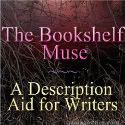I feel like I've read 150 books on the craft of writing this year; in my nightmares I'm stumbling through a Dickensian fog of them, pages piling around me in drifts. All offer useful tips and tricks -- never do I close the book (or hurl it across the room, or weep over its pages) without at least a few takeaways. But a handful stand out as books that have changed the way I see the world; they're books that have sent me back for my 5th-plus revision on my work-in-progress with joy in my heart rather than dread. On occasion they speak to something that I feel I knew deeply all along but failed to recognize consciously until that "ah-ha" moment on page, say, 57. And the really great ones have lifted me, have made me feel I'm capable of more than I rightly ought to be. Here they are, in no particular order:
1. Second Sight, by Cheryl B. Klein
I almost didn't order this book, because the jacket copy was so blaaah ("It always helps to get a fresh point of view. Try a little Second Sight"). Which is ironic, because as a senior editor for Scholastic (Klein, pictured left, works with Arthur Levine), she's had to write a lot of jacket copy herself. "Try a little" doesn't even begin to describe what aspiring children's writers (and indeed, published ones, and editors, and anybody interested in literature at all) ought to do with this book: If you know what's good for you, you'll memorize it. Klein's discussion in Chapter 1, "Manifesto: What Makes a Good Book?" is the single most brilliant summary of the elements that create lasting, beloved literature (for kids or otherwise) that I've ever read. Her blog, here, is also invaluable.
2. Story, by Robert McKee
I'll be honest, I haven't exactly finished this tome. But I've read the opening chapter many, many times. It doesn't matter a bit that McKee is focussed on screenwriting (he's mentored so many writers and directors it seems like even he's lost count.) Because what McKee does in Story: Substance, Structure, Style, and the Principals of Screenwriting is manage to convey the strongly worded idea that crafting great stories is vitally important. Like, as necessary as food and shelter to human culture and history. That's what he means by substance. And McKee also conveys that should you be called upon to create stories, whether for page or screen, you'd better damn well step up. McKee hosts expensive weekend seminars all over the country (I think last time I checked the tuition was nudging at $1,000.) But buy the book, because Chapter 1, "The Writer and the Art of Story" is worth every penny of the $25 price tag.
3. The Art of Fiction: Notes on Craft for Young Writers, by John Gardner
This was the first craft book I read this year, and I keep going back to it, not least because Gardner's style is so elegant. I love the very rhythm of his sentences. On the experience of reading, he says: "We read on--dream on--not passively but actively, worrying about the choices the characters have to make, listening in panic for some sound beyond the fictional door, exulting in characters' successes, bemoaning their failures. In great fiction, the dream engages us heart and soul..." Gardner also offers dozens and dozens of lively exercises to get the creative gears turning. Particularly helpful when the cranky old genius is feeling a little sluggish.
4. Reading Like a Writer, Francine Prose
Writers should be reading, and doing it carefully, n'est-ce pas? And since, as Prose so rightly points out, there are only so many hours in the day, we'd best start with the really great books, just in case we don't have time to get to the merely good, or the not-so-good, or the rotten ones. Prose's analysis of Austen, Henry Green, Tolstoy, Flannery O'Connor, Kafka, Nabokov and a great many others would have been enough to hold us, but she's structured the book by chapters in ascending order, from words and sentences to paragraphs, from narration to character and dialogue, details and gesture. And then, when your head is about to explode, she devotes a whole chapter to "Reading for Courage." If there were ever a quality a writer needs in spades, it's that one. Here's a single wonderful quote that we should all paste to our mirrors: "And as I wrote I discovered that writing, like reading, was done one word at a time, one punctuation mark at a time. It required what a friend calls 'putting every word on trial for its life.'"
Thursday, August 18, 2011
Four Must-Read Writing Books
Subscribe to:
Post Comments (Atom)


















I'm writing these down. I own Story--I've always loved it--but I have to admit that I've found a new book on craft that I like even more: Save the Cat by Blake Snyder. It's also a book on writing screenplays that sell, but it makes everything so simple and easy to apply, which I didn't find to be the case with Story. Though McKee had a lot of really great thins to say, I had to read his book a few times to really understand it. Save the Cat has done for me what you mentioned, sending me back to revise with a sense of joy instead of drudgery.
ReplyDeleteBecca @ The Bookshelf Muse
Thanks for the rec, Becca, I'll definitely look for Save the Cat.
ReplyDeleteI say many thanks to the father of the website admin I read this, because at this website I know a lot of information information that I did not know before his
ReplyDeleteCara Menghilangkan Penyakit Keputihan Pada Wanita
Obat Mata Katarak Terbaik
Multi-Vitamin Untuk Kesehatan Anak
Obat Tumor Alami Herbal
Obat Melancarkan Peredaran Darah
Cara Merawat Mata Agar Tetap Segar dan Sehat
Cara Mengatasi Gangguan Susah Tidur
Obat Nyeri Buang Air Kecil Pada Wanita
Obat Pembersih Usus Kotor
Obat Angin Duduk Tradisional